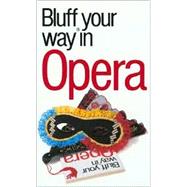
| Some Basic Definitions | p. 7 |
| The Beginnings of Opera | p. 9 |
| Further History | p. 10 |
| The Operatic World | p. 13 |
| Critics and Historians | p. 15 |
| Audiences and Opera Lovers | p. 16 |
| Singers | p. 18 |
| Gestures | p. 18 |
| Props | p. 20 |
| Voices | p. 20 |
| A Few Good Phrases | p. 24 |
| Voices of the Past | p. 26 |
| Opera Plots | p. 28 |
| Useful Operas | p. 30 |
| Operetta | p. 34 |
| Modern Stuff | p. 35 |
| Composers | p. 37 |
| Mozart | p. 37 |
| Verdi | p. 38 |
| Wagner | p. 42 |
| The Inis and the Ettis | p. 44 |
| Puccini | p. 44 |
| Donizetti | p. 45 |
| Bellini | p. 46 |
| Rossini | p. 47 |
| Beethoven | p. 48 |
| Bizet | p. 48 |
| Boito | p. 49 |
| Borodin | p. 49 |
| Britten | p. 50 |
| Cimarosa | p. 50 |
| Debussy | p. 50 |
| Giordano | p. 50 |
| Gluck | p. 51 |
| Gounod | p. 51 |
| Handel | p. 52 |
| Humperdinck | p. 52 |
| Janacek | p. 53 |
| Leoncavallo | p. 53 |
| Mascagni | p. 53 |
| Massenet | p. 53 |
| Menotti | p. 53 |
| Meyerbeer | p. 54 |
| Monteverdi | p. 54 |
| Nicolai | p. 55 |
| Offenbach | p. 55 |
| Paisiello | p. 55 |
| Ponchielli | p. 56 |
| Salieri | p. 56 |
| Smetana | p. 57 |
| Strauss | p. 57 |
| Thomas | p. 58 |
| Thomson | p. 58 |
| Death Notes | p. 59 |
| Some Good Quotes | p. 60 |
| Glossary | p. 61 |
| Table of Contents provided by Syndetics. All Rights Reserved. |
The New copy of this book will include any supplemental materials advertised. Please check the title of the book to determine if it should include any access cards, study guides, lab manuals, CDs, etc.
The Used, Rental and eBook copies of this book are not guaranteed to include any supplemental materials. Typically, only the book itself is included. This is true even if the title states it includes any access cards, study guides, lab manuals, CDs, etc.
Excerpted from The Bluffer's Guide to Opera: Bluff Your Way in Opera by Peter Gammond
All rights reserved by the original copyright owners. Excerpts are provided for display purposes only and may not be reproduced, reprinted or distributed without the written permission of the publisher.